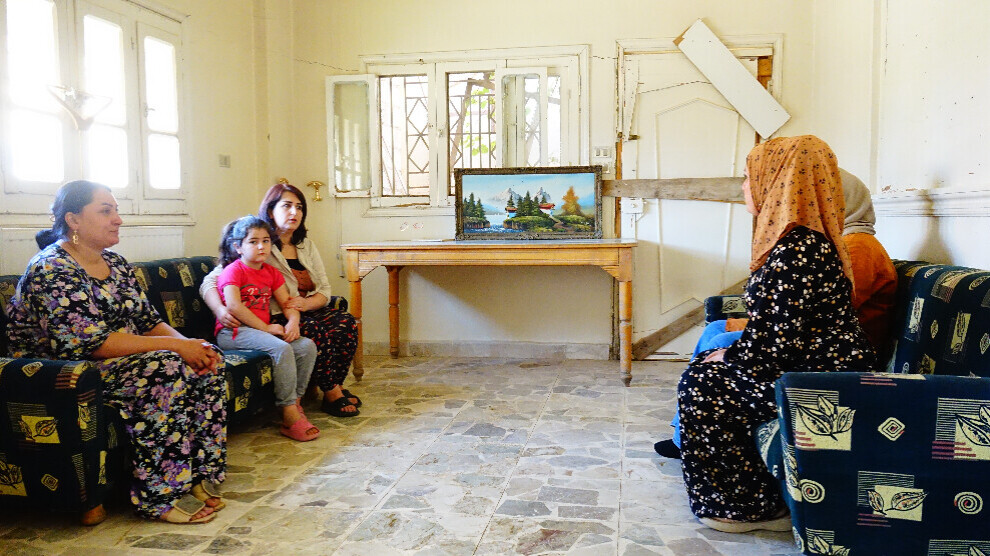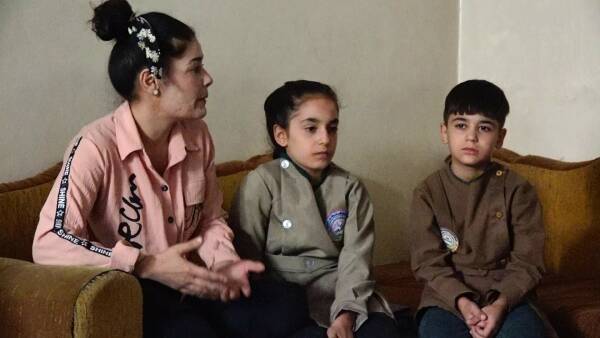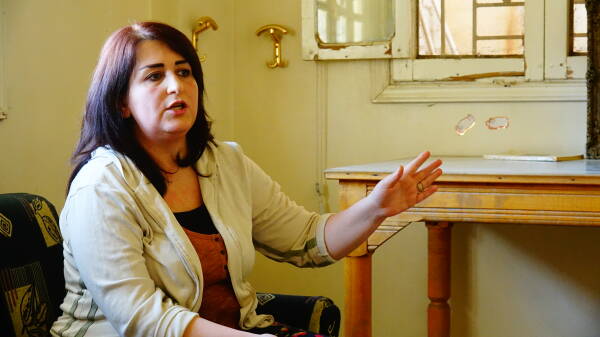Alevi Migrant Women: We Are Safe in North and East Syria
Kongra Star visited families who migrated from Syria’s coastal cities to Til Temir in the Cizîrê Canton. The women stated that they found in North and East Syria the peace that was absent in their own regions.

SORGUL ŞÊXO
Til Temir – This year, jihadist groups of Hayat Tahrir al-Sham (HTS) launched attacks on Alevi-populated coastal cities starting from Adara, carrying out massacres. According to available information, forced displacement, rape, murder, and violence against women continue.
Families who found a safe living space in North and East Syria have settled in the cantons. Two of these families were relocated to Til Temir in the Cizîrê Canton.
The Autonomous Administration provides for their needs. Likewise, their children are attending Autonomous Administration schools. To show solidarity with Alevi women, Kongra Star visited Alevi families who were forced to migrate from the province of Homs.
During the visit, Kongra Star expressed its support and solidarity with Alevi women. The women spoke about the massacres and pressures carried out by HTS against Alevi women.
Migration of women continues, female students cut off from education

Weed El-Necar said that killings and forced displacement of women in the coastal cities continue, and that female students, due to the danger of displacement, can no longer go to university or continue their education. She noted that women remain confined within the four walls of their homes. She emphasized that the massacres in the coastal cities show the level of the state’s hatred toward Alevis.
Weed stated that HTS told them, “You cannot live as Alevis; Alevism is forbidden,” and that they wanted to expel the Alevi people.
Peace absent in the coastal cities was found in North and East Syria
Weed said that they found in North and East Syria the peace and security they had lost in the coastal cities, and that she no longer fears for the lives of her children and daughter. Expressing her respect to the Autonomous Administration, she said the Autonomous Administration embraced Alevi migrants as if they were their own sisters and brothers.
Weed emphasized that Syria's future with HTS is not bright and drew attention to HTS's practices: “Since coming to power, they have openly shown what they intend to do. There is no government, no state; only the science of killing and opening the doors of ignorance. They want to return Syria to the age of ignorance. Think of a doctor: they kill them, but they keep terrorists alive.”
Nothing turns into action under imposed bans
Weed spoke about the pressures HTS imposes on women, noting that they try to imprison women within four walls, strip them of their rights one by one, and condemn them to housework and child-rearing. She continued: “Despite all the written decrees, nothing is put into practice. The laws are not enforced, everything remains only on paper. In reality, there is no freedom.”
A democratic and decentralized system is necessary
Weed stressed the importance of protecting Alevis, the second largest community in Syria, and said: “The Baath regime, like HTS, also harmed the Alevi people. The claims that Alevis were close to the state are not true. What is needed is a democratic and decentralized system that can protect the rights of women and peoples.”
“Massacres show the oppression imposed on Alevis”

Sociologist Lema Teraf had been a teacher in the coastal cities but, due to HTS’s impositions and pressures, could no longer continue teaching there. For this reason, she told Kongra Star in detail about the massacres carried out by HTS.
Lema recalled the killing of her female students in the massacres and continued: “We close our eyes, but the images come before us and do not go away. The fear of displacement is immense.”
Decisions on changes in education
Lema spoke about changes in the education system in schools in the coastal cities, saying: “HTS took control of everything. In English language textbooks, they tear out pictures of girls. They reduced lessons in art, music, and sports, while increasing Islamic education lessons. Here, life has been put under siege. In other words, life has been killed. With sports, music, and art, we tried to help children cope with the atmosphere of war, with the funerals, and the violence they witnessed. But when even these are banned, life is killed.”
Attacks on our symbols
Lema said that here there is respect for languages, cultures, and faiths, and that all peoples understand one another. Kurds and Assyrians speak their own languages yet understand each other. “Here there are both churches and mosques, which is the best part. But what saddens us is that our churches and mosques in the coastal cities were destroyed and demolished. Our religious symbols were attacked,” she said.
A world of zombies and vampires
Lema stated that humanity has been lost in Syria, saying: “We live in a world of zombies and vampires”
